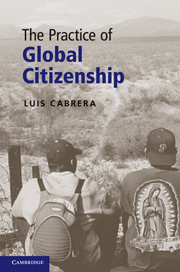Book contents
- Frontmatter
- Contents
- Preface
- Acknowledgments
- Introduction
- Part I Theoretical concerns
- Part II Global citizenship in practice
- Part III Advocacy and institutions
- 7 Regional citizenship and global citizenship
- 8 Advocacy duties and global democracy
- 9 Education and motivation for global citizenship
- Conclusion: the practice of global citizenship
- Appendix
- Works cited
- Index
7 - Regional citizenship and global citizenship
Published online by Cambridge University Press: 05 June 2012
- Frontmatter
- Contents
- Preface
- Acknowledgments
- Introduction
- Part I Theoretical concerns
- Part II Global citizenship in practice
- Part III Advocacy and institutions
- 7 Regional citizenship and global citizenship
- 8 Advocacy duties and global democracy
- 9 Education and motivation for global citizenship
- Conclusion: the practice of global citizenship
- Appendix
- Works cited
- Index
Summary
The most advanced formal practice of trans-state citizenship is to be found within the European Union. EU citizenship has extended the recognition of uniform citizen rights and duties across a diverse geographic area spanning twenty-seven states, with a population of some 500 million persons. With other aspects of European integration, it has facilitated the transfer of large amounts of resources to promote development in less-affluent member states and regions. The evolution of European citizenship, and the more comprehensive inter-state cooperation promoted by the European integration process, has, in short, helped secure for millions of Europeans in such states as Spain, Ireland, and Portugal at least some of what world leaders elsewhere, including former Mexican President Fox, have been striving to gain for their own citizens.
In fact, Fox, who traveled Europe as a Coca Cola executive in the 1970s and lived with his family in Paris in the 1980s, emphasizes ways in which it was historically a region of “have” countries and have-nots. As integration progressed, he observed states with emigration and economic profiles not unlike Mexico’s making dramatic gains:
In one generation, per capita incomes in Spain [registered] a fivefold increase … Today Spain is one of the world’s wealthiest nations, a financial superpower whose banks, hotel chains, and telecom entrepreneurs are flexing their muscles throughout Europe and Latin America … Or take the case of Ireland, which just a generation ago was one of the poorest countries in Europe – with a per capita income of roughly $3,000 per year, about the same as Mexico’s in 1975. Now Ireland is one of the world’s richest countries … (Fox 2007, 100–1)
Mexico, Fox suggests, could realize the same kinds of benefits within a more comprehensive North American integration project, a “NAFTA-plus.” Such possibilities are of central importance here, as the European Union’s citizenship regime is considered as a model for trans-state and possibly global citizenship. I will argue that the EU’s lack of a robust, trans-state regime of social welfare protections, and especially its increasingly exclusionary stance toward outsiders, make it problematic as a full model for citizenship above the state. The EU, however, does serve as a potentially very important model for promoting economic development within less-affluent states, and for expanding over time the set of trans-state rights affirmed for both regional citizens and legal residents. Close attention to such aspects of EU integration and citizenship, as well as to potentially “creative tensions” related to unauthorized immigration, can deeply inform institutional advocacy efforts in other regions, as well as at the global level.
- Type
- Chapter
- Information
- The Practice of Global Citizenship , pp. 181 - 210Publisher: Cambridge University PressPrint publication year: 2010

